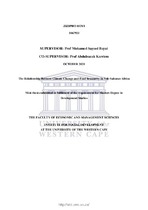| dc.description.abstract | According to the research conducted for this thesis, climate change has a potential to be a
hazard to food security in not only South Africa, but also to most of Sub-Saharan Africa. The
threat is presented in terms of food distribution and consumption, including agricultural
productivity. Food security is impacted by global warming, global warming in turn is a direct
result of climate change since it affects the supply of food, its accessibility, how it is utilized,
and whether or not people can afford it. The only way to mitigate the dangers is through an
integrated policy approach that protects fertile land from global warming. The key point
presented here is that Sub-Saharan Africa has all of the resources necessary to adapt to climate
change and secure food supplies; nevertheless, it is critical that they first recognize the hazards
that various agricultural products face because of global warming. However, a lot of emerging
countries face significant challenges as a result of a lack of robust institutions, making policy
changes difficult. The influence on food security will be significant, and it may be broken down
into three categories: availability, access, and use. Systematic peer-reviewed literature reviews
of climate change and food security research were undertaken utilizing the realist review
approach as the methodology for this study. In order to alleviate the region's acute food
insecurity, adaptation approaches were thoroughly investigated. This is related to development
challenges, where adaptation is necessary to mitigate negative effects and improve the
population's ability to participate in development processes. Finances are also a concern for
poor countries, such as South Africa, because there is a disparity between the cost of adaptation
and government subsidies. The remedy could come in the form of technology interventions
that help to make food systems less vulnerable to dangers. | en_US |

